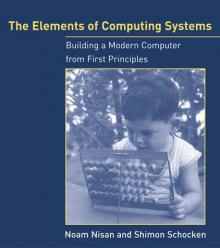
|
FreeComputerBooks.com
Links to Free Computer, Mathematics, Technical Books all over the World
|
|
- Title: The Elements of Computing Systems: Building a Modern Computer from First Principles
- Author(s) Noam Nisan, Shimon Schocken
- Publisher: The MIT Press (March 31, 2005); eBook (The Internet Archive Edition)
- License(s): Public Domain Mark 1.0
- Paperback: 344 pages
- eBook: PDF (410 pages)
- Language: English
- ISBN-10/ASIN: 0262640686
- ISBN-13: 978-0262640688
- Share This:

|
In the early days of computer science, the interactions of hardware, software, compilers, and operating system were simple enough to allow students to see an overall picture of how computers worked. With the increasing complexity of computer technology and the resulting specialization of knowledge, such clarity is often lost.
Unlike other texts that cover only one aspect of the field, this book gives students an integrated and rigorous picture of applied computer science, as its comes to play in the construction of a simple yet powerful computer system. Indeed, the best way to understand how computers work is to build one from scratch, and this textbook leads students through twelve chapters and projects that gradually build a basic hardware platform and a modern software hierarchy from the ground up.
In the process, the students gain hands-on knowledge of hardware architecture, operating systems, programming languages, compilers, data structures, algorithms, and software engineering. Using this constructive approach, the book exposes a significant body of computer science knowledge and demonstrates how theoretical and applied techniques taught in other courses fit into the overall picture.
Designed to support one or two-semester courses, the book is based on an abstraction-implementation paradigm; each chapter presents a key hardware or software abstraction, a proposed implementation that makes it concrete, and an actual project. The emerging computer system can be built by following the chapters, although this is only one option, since the projects are self-contained and can be done or skipped in any order.
All the computer science knowledge necessary for completing the projects is embedded in the book, the only pre-requisite being a programming experience.The book's web site provides all tools and materials necessary to build all the hardware and software systems described in the text, including two hundred test programs for the twelve projects. The projects and systems can be modified to meet various teaching needs, and all the supplied software is open-source.
About the Authors- Noam Nisan is a Professor of Computer Science in the School of Engineering and Computer Science of the Hebrew University of Jerusalem
- Shimon Schocken
- Computer System, Organization, and Architecture
- Computer Hardware, Personal Computers, and the History of Computers
- Electronics and Chips Design/Programming
- Computer Operating Systems
- Electronic and Computer Engineering

- The Elements of Computing Systems: Building a Modern Computer from First Principles
- The Mirror Site (1) - PDF
- The Mirror Site (2) - PDF
- The Mirror Site (3) - PDF
-
 Computer Organization and Design Fundamentals
Computer Organization and Design Fundamentals
This book takes the reader from the basic design principles of the modern digital computer to a top-level examination of its architecture. The material is presented using practical terms and examples for a better computer systems design.
-
 Basic Computer Architecture (Smruti R. Sarangi)
Basic Computer Architecture (Smruti R. Sarangi)
This book is a comprehensive text on basic, undergraduate-level computer architecture. It includes the combinational units, ALUs, processor, basic 5-stage pipeline, and a microcode-based design.
-
 Computer Systems: A Programmer's Perspective, 2nd Edition
Computer Systems: A Programmer's Perspective, 2nd Edition
This book introduces the important and enduring concepts that underlie computer systems by showing how these ideas affect the correctness, performance, and utility of application programs.
-
 Principles of Computer System Design: An Introduction (J. Saltzer)
Principles of Computer System Design: An Introduction (J. Saltzer)
This book takes a principles-based approach to the computer system design. Through carefully analyzed case studies from each of these disciplines, it demonstrates how to apply these concepts to tackle practical system design problems.
-
 Scientific Programming and Computer Architecture
Scientific Programming and Computer Architecture
The book digs into linkers, compilers, operating systems, and computer architecture to understand how the different parts of the computer interact with programs. It begins with a review of C/C++ and explanations of how libraries, linkers, and Makefiles work.
-
 How Computers Work: Processor and Main Memory, 2nd Edition
How Computers Work: Processor and Main Memory, 2nd Edition
This book starts out very simple and gets more complex as it goes along, but everything is explained. The processor and memory are mainly covered. It explains in great detail the operation of a simple but functional computer.
-
 The Secret Guide to Computers (Russ Walter)
The Secret Guide to Computers (Russ Walter)
It's the one book that covers everything today's beginners and near-beginners need to know: not just about Windows, but also about software, hardware, and the Internet. It explains complicated concepts simply and clearly, and empowering beginners.





